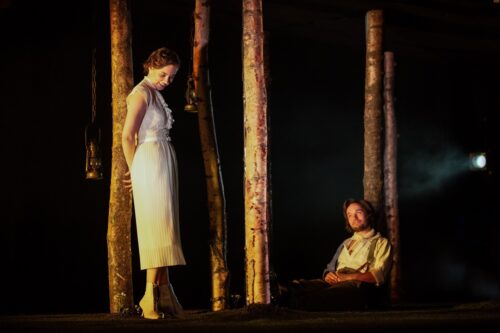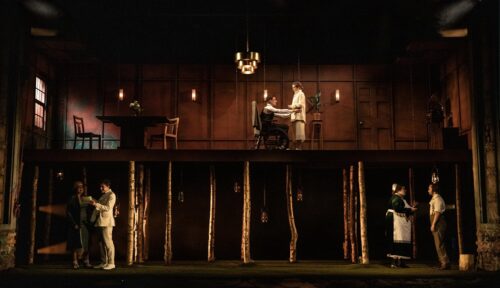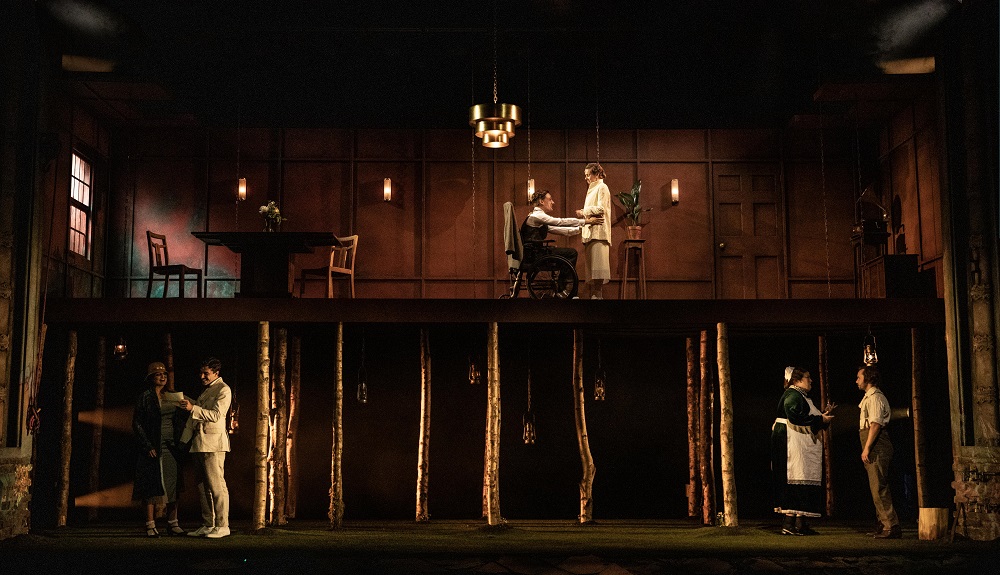 United Kingdom Lady Chatterley’s Lover: a musical adaptation of the novel by D.H. Lawrence from Phil Willmott (book), John Robinson (music and lyrics), Mark Anderson (additional lyrics) and Bjorn Dobbelaere (orchestrations). Filmed at London’s Shaftesbury Theatre in June 2021 and available from 15 October to 21 November 2021 on Stream.Theatre. (JPr)
United Kingdom Lady Chatterley’s Lover: a musical adaptation of the novel by D.H. Lawrence from Phil Willmott (book), John Robinson (music and lyrics), Mark Anderson (additional lyrics) and Bjorn Dobbelaere (orchestrations). Filmed at London’s Shaftesbury Theatre in June 2021 and available from 15 October to 21 November 2021 on Stream.Theatre. (JPr)

Production:
Director – Sasha Regan
Designer – Andrew Exeter
Costume designer – Jasmine Swan
Lighting – Nic Farman
Movement director – Chris Whittaker
Cast:
Tommy Dukes – Jake Halsey-Jones
Sir Clifford Chatterley – Sam Kipling
Lady Constance Chatterley – Georgia Lennon
Mrs Helen Bolton – Emma Lindars
Oliver Mellors – Michael Pickering
Bertha – Zoe Rogers
After Oscar Wilde’s famous philosophical novel had been unsuccessfully re-imagined as Dorian: A Rock Musical I did not have particularly high hopes for what would become of D.H. Lawrence notorious Lady Chatterley’s Lover as another musical, though in the end I was very pleasantly surprised with what has been achieved. First published privately in 1928 it was decades before an unexpurgated version was widely available and there was, of course, the landmark 1960 obscenity trial when – after much deliberation – its sexually explicit content was deemed not to be obscene. Phil Wilmott and John Robinson’s adaptation premiered for a couple of days at London’s Shaftesbury Theatre this summer specifically so it could be filmed for this release on Stream.Theatre.
Great literature is sadly rather a blackhole in my otherwise broad interest in the arts and I must confess I have never read Lawrence’s original novel nor given TV or film adaptations of it little more than a passing glance. A little research suggests that Wilmott is not particular faithful to Lawrence. He certainly takes a number of liberties and central to this is reinventing a straitlaced Lawrence character, Tommy Dukes, as flamboyant, openly gay, and someone who is having his own problems with the law over the homoerotic content of his writing. When Constance (Lady Chatterley) has been given carte blanche to try and conceive a scion for the Chatterley’s Wragby Hall in Derbyshire, Tommy also seems – despite her having been told by him that she is ‘meowing up very much the wrong tree’ – to have been her lover for all of 2½ minutes!

Sir Clifford Chatterley’s need for an heir is due to him being paralysed from the waist down fighting in the Great War and this was vividly recreated by director Sasha Regan in a brief scene. We learn how Oliver Mellors was Clifford’s batman and probably saved his life (possibly on more than one occasion) though he is looked down upon because of his lowly birth, local dialect and interest in Bolshevism. The wealth of the Chatterleys at Wragby Hall is dependent on their coal mine and there is great local resentment due to a terrible mining disaster in years gone by possibly because of insufficient safety measures being in place due to cost-cutting. How the Chatterleys have got rich on the labour and sacrifice of their miners is emphasised by Andrew Exeter’s two-level set, the slightly austere and claustrophobic wood panelled Wragby Hall above supported by wooden pit props (with lanterns attached) below. The latter doubling for the ‘woods’ where Constance and Mellors will have their rather (as here) chaste encounters.
Wilmott emphasises the class envy which for years has stopped this country reaching its full potential (IMHO) with those who don’t have demanding – rather than (as in the U.S.?) aspiring to – what they see others have got and they want. Clifford’s happiness at his wedding to Constance is fleeting and he is increasingly resentful at being confined to a wheelchair and the lack of an heir. Despite referral to a clinic in Vienna and Constance having undergone some unpleasant treatment, Clifford also suggests she could have a child by another man and that is why Constance initially turns to Tommy. Meanwhile Clifford feels somewhat beholden to Mellors and offers him the job of gamekeeper on his estate. Mellors is not at all happy and wants to better himself especially if it could come at the downfall of the capitalist class.
All it takes is one look at Mellors with his shirt off to stir the passions of the oddly rather gauche Constance, who doesn’t seem to be in an entirely sexless relationship with Clifford and is undergoing all the medical procedures to try and get pregnant. (Suffice to say a five-minute interval cannot come quick enough – depending on your point of view – as those with lurid imaginations can conjure up what might be happening unseen between Constance and Mellors.)
After Constance requests a key to Mellors’s hut, Clifford (who has become a successful writer) become increasingly angry with him. Then at one point he seems to lose the plot entirely and retreat to the trenches demanding ‘kit inspection before every battle’ when wanting to approve what Constance wears. There are only six main characters in this musical and the remaining two are Mrs Helen Bolton and a lowly servant Bertha. The very forceful and plain-speaking Mrs Bolton has become Clifford’s nurse. While he was reluctant to take her help at first ‘Nana’ (as he calls her) exerts increasing influence on him (‘Nana knows best’) allowing her to sign what she wants on his behalf as he seems to also regress into childhood. Mrs Bolton reveals she is ‘standing up for the miner’s rights’ and [spoiler alert] we discover her husband was killed in the infamous mining accident and that she took in two children orphaned as result of it, Bertha and Mellors!
Nature takes its course and Constance is now pregnant and hopes that she and Mellors can runaway together, but he has bigger plans and bringing a child into an already overcrowded world is not for him. Anyway, we had already learnt that he was married to Bertha when very young and – in the eyes of the law – probably still is. Constance leaves Clifford since the child deserves a better start than Wragby Hall and actually writes to Tommy that the baby is his. At the end Clifford seems content with Nanna, Tommy has met Bertha, and Constance and Mellors part as friends with her concluding that at least she had found the love in her life that was not there before.
The more I reflect on this Lady’s Chatterley’s Lover, the more I am impressed with what I saw over the ninety minutes. It is obvious care had been taken to cast six extremely accomplished singing-actors who bring it all to life as a drama and create believable characters, which, for me, superseded the fact it is now a musical. Equal care has been taken by John Robinson and collaborators over the score which is not Hamilton and more Andrew Lloyd Webber/Claude-Michel Schönberg especially with its soaring solos, duets, as well as concluding sextet. There is a lot of anthemic emoting and revealing of inner thoughts and feelings which are occasionally only adequately served by Robinson’s Tim Rice-like rhymes from one of the first ‘You are so reliable and above all desirable’ onward. However, the small band of six, comprising two (often tinkly) keyboards and some warm strings, sound very accomplished under musical director Michael Bradley (on keys) and contribute to the overall success. There seems to be some additional effects both sound (bell tolling, bird song, and dripping rain) and vocal (a chorus ahhing?) to add to the pervading atmosphere. (At one point the lovers kiss and we hear them singing at the same time, quite a feat!)
The acting and singing is uniformly superb and better than you would see and hear in many musicals. Georgia Lennon’s Constance begins as a dutiful wife who appears somewhat unaware of the world outside her closeted existence, and you do not see her infatuation with Mellors coming. In hindsight I would have liked more repressed sexuality from her. Michael Pickering’s Mellors is proud man who is steadfast in his beliefs though conflicted by his affection for Constance. Sam Kipling’s disability has psychologically scarred him making him bitter and twisted and there is even a hint that the war has left him suffering from PTSD. His performance also reminded me of the famous John Cleese sketch which begins ‘I look down on him [Ronnie Barker] because I am upper class’. Jake Halsey-Jones’s charismatic Tommy could have been a caricature but – to his immense credit – was not. Emma Lindars is the formidable and self-possessed Mrs Bolton and Zoe Rogers’s flighty Bertha get a heart-rending moment in the spotlight as she reveals her character’s sad backstory.
In closing I do believe this version of Lady Chatterley’s Lover could have a future, if not in the West End, then maybe on tour or as a ‘proper’ film. However, for a novel that was kept from corrupting(!) its readers for so long this version is a little tame by comparison and you will see more bare flesh and passion on a Saturday night watching Strictly Come Dancing.
Jim Pritchard
